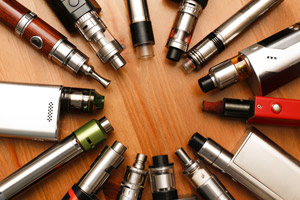 E-cigarettes, also known as e-cigs and vape pens, are extremely popular and currently marketed as a cigarette alternative. These devices are battery-powered and designed to mimic cigarettes by vaporizing a liquid that contains nicotine, which is inhaled by the user. With a rise in popularity, the federal government, along with many states, have decided to step in and regulate or ban certain types of products associated with vaping.
E-cigarettes, also known as e-cigs and vape pens, are extremely popular and currently marketed as a cigarette alternative. These devices are battery-powered and designed to mimic cigarettes by vaporizing a liquid that contains nicotine, which is inhaled by the user. With a rise in popularity, the federal government, along with many states, have decided to step in and regulate or ban certain types of products associated with vaping.
Federal Partial Vaping Ban
As of May 2016, the Food and Drug Administration (FDA) has the authority to regulate the manufacture, import, packaging, labeling, advertising, promotion, sale, and distribution of e-cigarettes.
Due to an increase in marketing vaping products to the public, the FDA has banned fruit, dessert, and mint-flavored products used in most e-cigarettes that use pre-filled pods. These flavored products have been extremely popular.
The ban will have only a limited impact on Juul, which is the industry-leading company in vaping and e-cigarette products, as they had already ceased the sale of all flavored products in the United States aside from menthol. However, Juul’s rival, NJOY, sells cartridge-based products and will likely suffer due to this federal vaping ban.
Additionally, there are products that are excluded from this ban, including open-tank systems and any flavored e-liquid that is not in pod form. This means that many products widely available in vape shops and in some areas, conveniences stores, are not covered by the ban. Puff Bar is a brand that falls under this exemption since they provide disposable e-cigarettes and their product comes in flavors, such as cool mint, mango, and strawberry. Therefore, while there is a partial vaping ban, it focuses on the mechanics of the e-cigarette rather than if the product dispenses flavors.
Compliance to remove all prohibited products will likely take some time and as such, there may be some stores that do not stop sales immediately pending any enforcement plan by the FDA. Any new prohibited products will not be allowed to re-enter the market unless they get clearance from the FDA in the future. Review by the FDA could take months or even years. The deadline for manufacturers of all vaping products, even those that are exempt, to submit applications to the FDA for sales authorization is May 12, 2020. Upon filing the application, the manufacturer’s products can stay on the market for one (1) year while it goes through the FDA review process. If an application is not filed, products must be removed from the market by the application deadline. Up to this point, the FDA has enforced the sale of vaping products at their discretion.
State Vaping Laws
Several states have already begun to restrict vaping and e-cigarettes. As of January 2, 2020, 19 states have enacted laws restricting e-cigarette use in 100% smoke-free venues, including California, Colorado, Connecticut, Delaware, Florida, Hawaii, Maine, Massachusetts, Minnesota, Nevada, New Jersey, New Mexico, New York, North Dakota, Oregon, Rhode Island, South Dakota, Utah, and Vermont. Additionally, the following 12 states enacted laws restricting e-cigarette use in other venues (schools, rail systems, correction facilities, grounds of state supported institutions, etc.): Arkansas, Georgia, Illinois, Kansas, Kentucky, Maryland, and New Hampshire, Oklahoma, Texas, Virginia, Washington, and Wisconsin.
Expect More Regulation
Currently, the vaping and e-cigarette industry is not subject to extensive government regulation, however, several advocacy groups such as the American Lung Association are pushing for both state and federal government to increase regulations of this product. In the coming months and years, manufacturers, retailers, and consumers can likely expect an increase in regulations regarding flavors of e-cigarettes and areas where vaping is prohibited.






